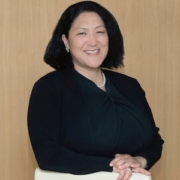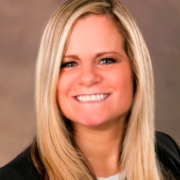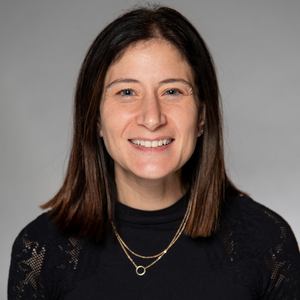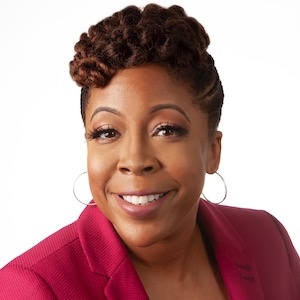Nhaman Pelphrey: Director, Abbot Downing
 “If you’re asked to the table, or opportunities present themselves to you, don’t second guess it,” says Nhaman Pelphrey, a director in the Los Angeles (LA) office. “There’s a reason people are asking for your participation—you have inherent value to add.”
“If you’re asked to the table, or opportunities present themselves to you, don’t second guess it,” says Nhaman Pelphrey, a director in the Los Angeles (LA) office. “There’s a reason people are asking for your participation—you have inherent value to add.”
Pelphrey speaks about moving from private law practice to wealth management at Abbot Downing, and the valuable insights in personal development she’s gathered.
Be Open to Unexpected Opportunity
“Although it may appear from my bio that my career path was by design,” says Pelphrey, “looking back, each opportunity that was presented at the time felt like a departure from what I was thinking I would do.”
After graduating from The Pennsylvania State University, Dickinson School of Law in 2004, Pelphrey had her eyes set on becoming a real estate lawyer in the booming southern California commercial market. “I wanted to represent developers and be at the forefront of the action.” Minutes into an interview, she realized she had neither the experience nor the know-how.
Though she was quickly told that they needed someone with requisite training to hit the ground running, she remained curious about the firm and built a strong rapport with the managing partners. Although the firm did not have capacity to train a junior attorney in real estate, they took a chance on her and offered her a position in their trusts and estates practice. It was not what she had set out to do, but she gave it a try.
Eleven years later, she had already disrupted her career, two years into it, for the unexpected step of a master of laws degree in taxation from Northwestern University School of Law, and was now sitting in a premier boutique planning firm in Century City, with a client profile of ultra-high-net-worth individuals.
Feeling successful, having served on the executive committees of the Beverly Hills Bar Association and the LA County Bar Association, having cultivated many strong network relationships with the ability to elevate one another, she felt at the peak of her law career—so she ignored the recruiter calls.
Until a colleague and friend, who had herself left private practice for Wells Fargo, urged her to consider going for an informational meeting—emphasizing opportunities at Abbot Downing do not often come around.
“I was accomplishing all the things that defined success to me,” recalls Pelphrey, “so leaving private practice was not a decision I took lightly.”
Six years later, Pelphrey calls the move to Abbot Downing the best career decision she’s made so far, rising from a senior wealth strategist to a director and multi-generational relationship manager for ultra-high-net-worth families.
“When opportunities present themselves, even if unforeseen or not necessarily what you were looking for,” says Pelphrey, “be open to them for they can lead you down paths that you didn’t even know were right for you.”
Rewarding Client and Team Relationships
Pelphrey enjoys the depth of value that she can add through nurturing long-term relationships with her family clients, and feels she works with “the brightest and most personable team.”
Back in the billable hours of her private practice legal days, her journey with clients would often end after counsel and creation of the plan. Now she partners with clients from the inception of formulating the plan to the most important and crucial aspect—implementation.
“We really get to know these individuals and their families very well,” says Pelphrey. “We become a trusted advisor and that’s a very gratifying position to be in.”
One thing she appreciates at Abbot Downing is the collaborative nature of her dynamic team. “We raise each other up and put our client’s best interest at the core of what we do.”
Mentors Who Raise You Up, Higher
One of Pelphrey’s first mentors, a big-time tax attorney, taught her a valuable lesson through a bit of playful testing.
As a young associate, she was asked to research and draft a memo on how to structure a corporate reorganization. In the tax partner’s explanation of the assignment he referenced multiple Internal Revenue Code sections that she had never heard of before. When she got back to her desk, she immediately googled the sections. After combing through multiple legal research databases to educate herself on the code sections, it was clear that the code sections were not applicable or even worse, she might have jotted them down incorrectly. She mustered up the nerve to knock on his door and let him know that the sections he quoted cannot be used as part of a structural reorganization.
He congratulated her with a big smile for saving herself several agonizing hours of spinning her wheels, only to fit a square peg in a round whole.
“From that moment on, I realized its okay to ask clarifying questions,” says Pelphrey. “He taught me that asking questions is the best way to ensure that you understand what you’re being asked and what the other person really needs.”
Later in her career, she had another mentor who was highly skilled and well-respective modeled the ability to express complex, technical strategies in a simple and easy to understand manner with clients, treating them like partners.
But what most impressed upon Pelphrey as a lesson was his approach to mentorship in supporting her to learn, hands-on.
“He said to me, ‘I know that you’re capable and my goal is to help you become a highly technical attorney and to be better than I am,’” she remembers. “I heard the selflessness. He wanted to help me be even better than him, not just good as a reflection of him—and his actions were aligned with that.”
At Abbot Downing, Pelphrey eventually assumed the position of her retiring mentor, who groomed her to take over much of his client book. The mentorship first arose because they appreciated each other’s wit and banter, and could together devise creative client solutions.
Not only did he encourage her to expand roles using more of her talents, but he also taught her that being a generous, genuine resource for others will come back to you ten-fold in opportunities.
Embody Your Place at the Table
Throughout her career, Pelphrey has often been the most junior person at the table.
“One of the lessons I’ve learned is if people are asking you to participate, they see that you have an inherent value,” says Pelphrey. “More so as women, we’re invited to be part of something and it’s often easy to second guess ourselves – ‘Am I too young? What is my role?’”
Cultivating personal confidence has become key to her success.
“If I’m at the table with successful and savvy clients, it’s because they know I have value to add,” she says. “We come in as a team and we’re confident as to what and how we can provide for our clients.”
Supporting Each Other and Being a Mom
Pelphrey enjoys gatherings that merge the wisdom and experience of her colleagues and her clients.
She participates in annual events designed to connect with, inform and inspire the younger generations among her client families—as well as women focused activities – where colleagues and clients support each other.
Having a competitive personality, Pelphrey calls herself the tennis and basketball “Kris Jenner equivalent” of a sports mom to her two sons, six and eight years old.
She enjoys supporting their participation and the valuable life lessons that is organically gained through sports.
Pelphrey feels the same when her sons get the opportunity to witness their normally organized parents navigate unknown territory and unexpected turns during international travels.
“I love the kids to see that we don’t always have it all together,” she laughs. “But we end up on a great adventure even if it wasn’t the plan.”
By Aimee Hansen
Abbot Downing, a Wells Fargo business, provides products and services through Wells Fargo Bank, N.A. and its various affiliates and subsidiaries. Wells Fargo Bank, N.A. is a bank affiliate of Wells Fargo & Company.










